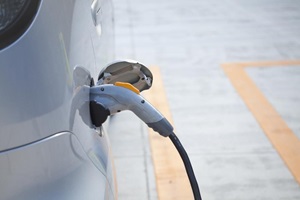- Hybrid Electric Vehicles
- Transportation Efficiencies
- Plug-In EVs
- CAFE Standards
Ford CEO’s 'Perfect' Comments in Context

The potential softening of US Corporate Average Fuel Economy (CAFE) standards that has been discussed of late has reignited the debate about consumer acceptance of electric vehicles (EVs). Under current regulation, EVs are crucial to automaker compliance strategies, but not all EVs are the same, nor are they treated similarly under the regulations. It’s an important aspect to clarify here as the debate about CAFE standards questions whether there is enough consumer demand for EVs to enable automakers to meet the standard’s targets. The administrators of CAFE, the Environmental Protection Agency (EPA), suppose it does, but some in the automotive industry disagree.
The most recent commentary provided to the debate was by Ford CEO Mark Fields, which Business Insider claimed “just perfectly summarized the biggest problem for electric cars.” Fields, in arguing there is not enough EV demand stated: “In 2008, there were 12 electrified vehicles offered in the U.S. market and it represented 2.3 percent of the industry … fast forward to 2016, there’s 55 models, and year to date it’s 2.8 percent.”
Hybrids and Plug-Ins
Fields’ data point deserves some deeper analysis. In the automotive industry, the term EV or electric car encompasses hybrids, plug-in hybrids (PHEVs), and battery electric vehicles (BEVs) because all these vehicles use electricity either harvested from vehicle braking and/or from the grid for traction. Within the design of current regulations, PHEVs and BEVs are heavily incentivized and provide far more benefit to automaker CAFE compliance strategies than do hybrids (though hybrids are an important component).
Fields’ statement is accurate when considering the entire pool including hybrids, but it does not address the demand of plug-in vehicles specifically, around which most of the debate has centered. To start, the laggardly market growth for EVs over this time period is specific to hybrids, which have contracted from the 2008 2.3% figure to 2% year to date. Of note, a vast majority of sales come from one automaker (Toyota). Meanwhile, plug-in (BEV and PHEV) sales started in 2011 and now have over 0.8% of the market year to date, and there is no one consistent or dominant market leader. Lumping all EVs together in regards to CAFE compliance is inexact when automakers are generally complaining about the requirements for plug-in EVs, which are in reality gaining market share and increasingly common among automaker portfolios, and are the vehicles which are most critical to automaker compliance.
Reasons for Decline
Given that, there are many reasons hybrid share may be in decline. One that usually gets a lot of attention is oil prices, which not only historically reduces sales of hybrids, but also has prompted a growing percentage of new vehicle sales to be SUVs and trucks (a market nearly devoid of hybrids) and fewer passenger cars. Another factor is the increasingly more fuel efficient non-EVs (due to CAFE standards), but the last and more critical reason is competition from the plug-ins themselves. Before the plug-ins arrived, hybrids were the energy efficiency leaders. Since plug-ins arrived, sales have arguably taken away from hybrids, and the impact to the overall hybrid-inclusive EV market has been relatively marginal in growing sales, which fuels the arguments for those who are critical of consumer demand for EVs.
Ultimately though, the feasibility of automaker compliance with current regulation hinges on consumer acceptance of plug-ins, not hybrids. To that effect, Fields’ data in relation to consumer demand and CAFE compliance is not perfect. Hybrids and other fuel efficiency technologies are certainly helpful but cannot be relied upon in isolation. Consumer response to battery cost and energy density improvements teased by the Tesla Model 3 and represented in the near-term BEV rollout of the Chevrolet Bolt will provide greater clarity here. However, regardless of the success these models may realize or have already realized, it is unlikely to have a significant impact on whether CAFE standards will be softened or not.